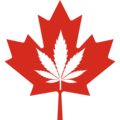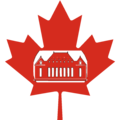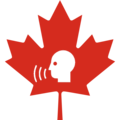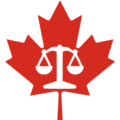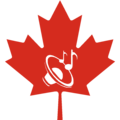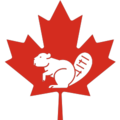Portal:Canada
| Showcase | Contents | Contributing |
Introduction
Canada is a country in North America. Its ten provinces and three territories extend from the Atlantic Ocean to the Pacific Ocean and northward into the Arctic Ocean, making it the world's second-largest country by total area, with the world's longest coastline. Its border with the United States is the world's longest international land border. The country is characterized by a wide range of both meteorologic and geological regions. With a population of just over 41 million people, it has widely varying population densities, with the majority residing in urban areas and large areas of the country being sparsely populated. Canada's capital is Ottawa and its three largest metropolitan areas are Toronto, Montreal, and Vancouver.
A developed country, Canada has a high nominal per capita income globally and its advanced economy ranks among the largest in the world by nominal GDP, relying chiefly upon its abundant natural resources and well-developed international trade networks. Recognized as a middle power, Canada's support for multilateralism and internationalism has been closely related to its foreign relations policies of peacekeeping and aid for developing countries. Canada promotes its domestically shared values through participation in multiple international organizations and forums. (Full article...)
Featured article -
The Invasion of Quebec (June 1775 – October 1776, French: Invasion du Québec) was the first major military initiative by the newly formed Continental Army during the American Revolutionary War. The objective of the campaign was to seize the Province of Quebec (part of modern-day Canada) from Great Britain, and persuade French-speaking Canadiens to join the revolution on the side of the Thirteen Colonies. One expedition left Fort Ticonderoga under Richard Montgomery, besieged and captured Fort Saint-Jean, and very nearly captured British General Guy Carleton when taking Montreal. The other expedition, under Benedict Arnold, left Cambridge, Massachusetts, and traveled with great difficulty through the wilderness of Maine to Quebec City. The two forces joined there, but they were defeated at the Battle of Quebec in December 1775. (Full article...)
Current events
- April 28, 2025 – 2025 Canadian federal election
- Voters in Canada go to the polls to elect the 343 members of the House of Commons to the 45th Canadian Parliament. (BBC)
- The Liberal Party under leader Mark Carney is projected to form government for the party's fourth consecutive mandate, with Carney remaining prime minister. (The Globe and Mail)
- Conservative Party leader Pierre Poilievre and New Democratic Party leader Jagmeet Singh lose their seats, with the NDP also losing official party status in the House. Each make speeches conceding the election, with Singh announcing his intention to resign as party leader. (CTV News)
- April 27, 2025 – 2025 Vancouver car attack
- The death toll from yesterday's vehicle-ramming attack at a street festival in Vancouver, British Columbia, Canada, rises to eleven with at least 20 others injured, making the attack tied for the deadliest vehicle-ramming attack in Canadian history. The British Columbia Prosecution Service charges the perpetrator with eight counts of second-degree murder, while investigators also rule out terrorism. (CTV News) (AP)
- April 26, 2025 – 2025 Vancouver car attack
- Nine people are killed and several others injured, after a car is driven through a crowd at a Philippine-Canadian festival in Vancouver, British Columbia, Canada. (Al Jazeera)
- April 25, 2025 –
- A Royal Thai Police Viking DHC-6 Twin Otter aircraft crashes while conducting a test flight for parachuting training near Hua Hin Airport in Prachuap Khiri Khan, Thailand, killing all six people on board. (The Nation) (AP)
Selected panorama -
National symbol -

An inuksuk (plural inuksuit) or inukshuk is a type of stone landmark or cairn built by, and for the use of, Inuit, Iñupiat, Kalaallit, Yupik, and other peoples of the Arctic region of North America. These structures are found in northern Canada, Greenland, and Alaska. This combined region, north of the Arctic Circle, is dominated by the tundra biome and has areas with few natural landmarks. (Full article...)
Selected vital article -
Canada has ten provinces and three territories that are sub-national administrative divisions under the jurisdiction of the Canadian Constitution. In the 1867 Canadian Confederation, three provinces of British North America—New Brunswick, Nova Scotia, and the Province of Canada (which upon Confederation was divided into Ontario and Quebec)—united to form a federation, becoming a fully independent country over the next century. Over its history, Canada's international borders have changed several times as it has added territories and provinces, making it the world's second-largest country by area. (Full article...)
Selected picture -
Featured biography -
Terrance Stanley Fox (July 28, 1958 – June 28, 1981) was a Canadian athlete, humanitarian, and cancer research activist. In 1980, having had one leg amputated due to cancer, he embarked on a cross-Canada run to raise money and awareness for cancer research. The annual Terry Fox Run, first held in 1981, has grown to involve millions of participants in over 60 countries and is the world's largest one-day fundraiser for cancer research; over C$900 million has been raised in his name through the Terry Fox Research Institute as of September 2024. (Full article...)
Did you know -

- ... that in 1819 Michael O'Sullivan, a member of the Legislative Assembly of Lower Canada, fought a duel in Montreal with William Caldwell over a proposal to create the Montreal General Hospital?
- ... that Canadian architect Barry Downs contributed to the redevelopment of the Expo 86 site in Vancouver, the largest private development in North America at the time?
- ... that Jonathan Beaulieu-Richard retired from the Canadian Football League to become a pharmacist?
- ... that Canadian football player Nicholas Dheilly tied his team's single-game sack record in his debut?
- ... that Canadian football player Pieter Vanden Bos was traded from the Roughriders to the Rough Riders?
- ... that in 2019, the Canadian government's Translation Bureau began providing translation services in Dene, East Cree, Plains Cree, and Mohawk?
- ... that the inclusion of the Canadian song "How Long" in a bootleg Russian DVD resulted in a sixteen-year search for the track's creator?
Featured list -
Canada's national parks are protected areas under the Canada National Parks Act, owned by the Government of Canada and administered for the benefit, education, and enjoyment of the people of Canada and its future generations. National parks are administered by Parks Canada, a Crown agency operating under the jurisdiction of the Ministry of Environment and Climate Change. The goal of the national parks system is to set aside lands representing the country's 39 distinct natural regions described in the National Parks System Plan, primarily to protect the ecological integrity of the land, and secondarily to allow the public to explore, learn about and enjoy Canada's natural spaces. (Full article...)
Main articles
Associated Wikimedia
The following Wikimedia Foundation sister projects provide more on this subject:
-
Commons
Free media repository -
Wikibooks
Free textbooks and manuals -
Wikidata
Free knowledge base -
Wikinews
Free-content news -
Wikiquote
Collection of quotations -
Wikisource
Free-content library -
Wikiversity
Free learning tools -
Wikivoyage
Free travel guide -
Wiktionary
Dictionary and thesaurus







